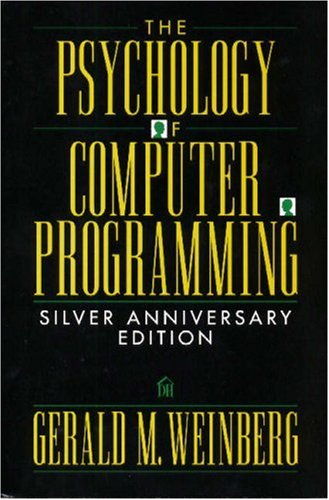Psychology of computer programming epub
Par won christopher le mercredi, décembre 28 2016, 23:12 - Lien permanent
Psychology of computer programming by Gerald M. Weinberg


Psychology of computer programming ebook
Psychology of computer programming Gerald M. Weinberg ebook
Page: 299
ISBN: 0932633420, 9780932633422
Format: djvu
Publisher: Dorset House
Why should you, as a psychology student, or indeed any other kind of student, need to learn computer programming? Instead of being focused solely on the code being written, The Psychology of Computer Programming looks at the thought process behind the person actually writing the code. Reliance on a related science – Dr. That question calls forth all of computer science from low-level machine design, through compilers, operating systems, programming and interaction design, to psychology and organisation theory. Psychology of Computer Programming book download Download Psychology of Computer Programming Weinberg. Humans are strange creatures who behave in odd ways sometimes. The Psychology of Computer Programming 398 pages | Sep 22 2010 |ISBN: 0442292643 | PDF | 5.5 Mb This book has a wealth of information on how programmers work when in groups, and is a useful. A thought provoking book on how humans program, and how they interact with others. I wrote the first draft of The Psychology of Computer Programming. Originally Released in 1971, follow ups added 1998. Weinberg's The Psychology of Computer Programming, which I first read in 1982. Our standards, in other words, are shifting ones---a fact that has to be taken into full consideration in programming language design. What made me change my mind and become a professional programmer? House and Sherlock Holmes rely heavily on Psychology. Jerry Weinberg was the first researcher to look at this stuff in his classic PSYCHOLOGY OF COMPUTER PROGRAMMING. The Psychology of Computer Programming: Silver Anniversary Edition by Gerald M. Programming is a human activity. Mostly a lot of questions to think about. Critical subject matter should include economics, statistics, mathematics, logic and systems modeling, current (not historical) cultural evolution, psychology, and computer programming.